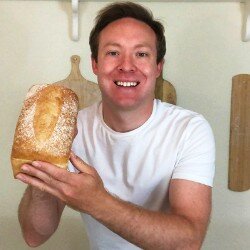
Is Sourdough Bread Suitable For Vegans?

A vegan diet is arguably the most sustainable and healthy life choice anyone can adopt. It’s not uncommon for people to wonder if sourdough bread is suitable for vegans, especially if they are new to it. This is because bread can be made with animal-derived ingredients.
The answer, fortunately, is a resounding yes! Sourdough bread can be eaten by vegans!!
Sourdough is an ancient type of bread that not only tastes good but is increasingly popular in the vegan community. Making it yourself ensures a plant-based product. But generally, a standard sourdough without non-vegan additions like cheese is vegan friendly.
Sourdough bread dough only consists of flour, water, salt and sourdough starter. A starter uses flour and water. There is no need to add any animal-derived products to make sourdough bread. The tangy flavour in sourdough bread is due to organic acids, there isn’t any dairy or eggs involved.
The quickest way to check if bread is suitable for vegans is to review the label. Allergy information should be easy to locate on the packaging and will tell you if the product contains dairy, milk or eggs.
Depending on the legislation of your country, fresh bread packaging may not display allergies. In this case, it’s best to ask the baker. You’ll want to check if there are any fats or sweeteners used. Or if they use a dough mix or conditioner if it is vegan approved. Also check how the baking tins are greased, or if butter or egg wash are brushed on the bread before or after baking.
Non-vegan ingredient list commonly used in bread
What are the common non-vegan ingredients used in bread making:
- Eggs
- Milk
- Lard
- Margarine
- Butter
- Cream
- Ghee
- Buttermilk
- Sodium caseinate
- Honey
- Whey
Bread ingredients that can come from plants or animals
To ensure these products don’t contain any animal products, check for vegan authenticity statements on the packaging. Unless you are buying from reputable suppliers you might want to avoid completely if you see the following ingredients on the label. These ingredients can contain non-vegan products.
Mono-glycerides and diglycerides
These forms of fat are used to increase the texture and preserve moisture as emulsifiers. They mostly come from soybean oil but can be derived from animals.
Lecithin
Usually derived from soybeans but lecithin can also come from egg yolks.
DATEM
Diacetyl tartaric acid ester of mono-and diglycerides. Also known as E472e, contains monoglycerides and diglycerides which can be animal-based.
List of popular vegan breads

These loaves of bread are usually vegan, however, it is a good idea to check the label if you are not making them yourself. I’ve also compiled a list of the most popular types to see which breads are safe to eat for vegans.
- Sourdough
- Ciabatta
- Focaccia
- Baguette
- Pita Bread
- Rye Bread
- Dutch/tiger bread
Breads that are usually not vegan
These breads are unlikely to be vegan unless specified as dairy products are integral to the recipe.
- Challah
- Naan
- Pullman loaf
- Brioche
- Garlic Bread
- Doughnuts
How to make sourdough recipes vegan friendly
Egg replacement
– Seeds
If your recipe uses eggs, try flaxseeds instead. They are a great vegan alternative. One tablespoon of flaxseed converts to one egg.
Take 15 grams or 1 tablespoon of flaxseeds or chia seeds and mix with 45 grams or 3 tablespoons of water in a small bowl. Leave to stand for 5 minutes to thicken and use as you would eggs.
– Aquafaba
Egg whites can also be replaced with Aquafaba. This is made from the liquid that legumes have been cooked in. Chickpea Aquafaba is the most popular version. You can buy it, or use this Aquafaba recipe to make it at home.
Milk replacement
Dairy milk can easily be replaced with soy, coconut, almond or rice milk. These kinds of milk are more viscous than dairy milk so you may need to reduce the amount used in the recipe so you don’t end up with slop!
Butter Replacement
Plant oils like rape, sunflower, olive or coconut are great ways to include fat in bread, without using butter. Likewise, vegan margarine can offer more tenderising properties than liquid oil.
Sweetener Replacement
Maple syrup is a great almost like-for-like alternative to honey. Many other sweeteners can be used including:
- Brown rice syrup
- Molasses
- Beet sugar
- Agave nectar
Ending thoughts
Yes, sourdough bread and yeast made bread can be made vegan. It is easy to make at home, however, when purchasing bread it’s best to review the label and make sure it is declared safe for vegan diets. If you want a sourdough recipe that is vegan safe, take a look at my beginner’s sourdough recipe.
Is sourdough bread suitable for vegans frequently asked questions
If you’ve enjoyed this article and wish to treat me to a coffee, you can by following the link below – Thanks x

Hi, I’m Gareth Busby, a baking coach, senior baker and bread-baking fanatic! My aim is to use science, techniques and 15 years of baking experience to make you a better baker.
Table of Contents
Related Recipes
Related Articles
Latest Articles
Baking Categories
Disclaimer
Address
53 Greystone Avenue
Worthing
West Sussex
BN13 1LR
UK








Leave a Reply